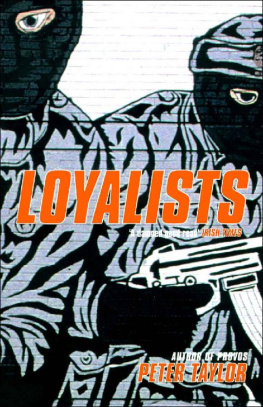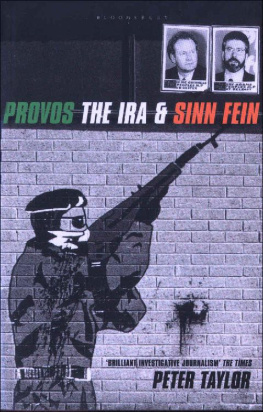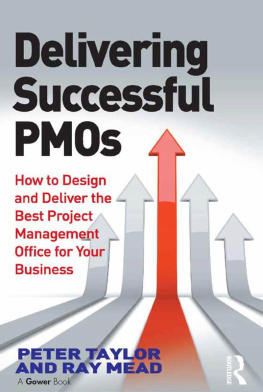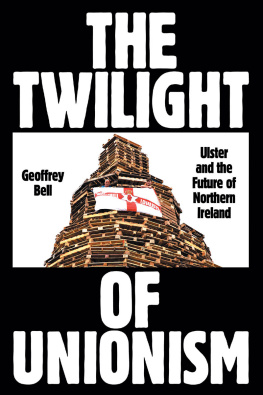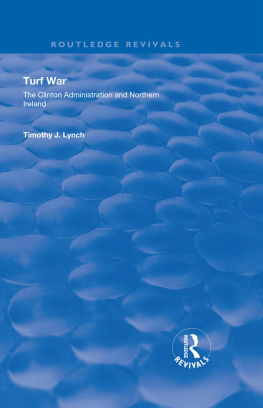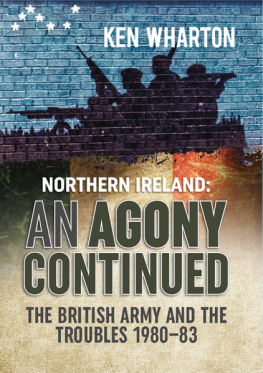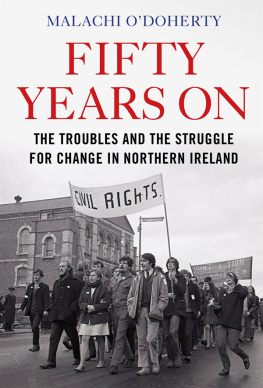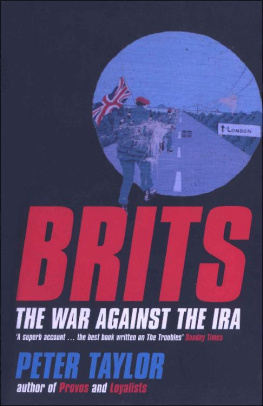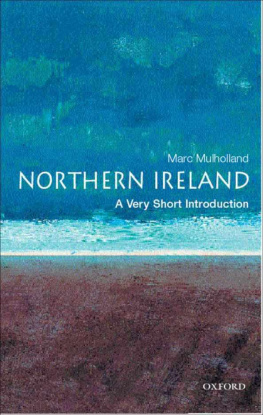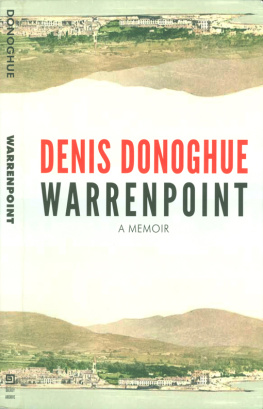Peter Taylor - Loyalists
Here you can read online Peter Taylor - Loyalists full text of the book (entire story) in english for free. Download pdf and epub, get meaning, cover and reviews about this ebook. year: 2000, publisher: Bloomsbury Publishing PLC
Romance novel
Science fiction
Adventure
Detective
Science
History
Home and family
Prose
Art
Politics
Computer
Non-fiction
Religion
Business
Children
Humor
Choose a favorite category and find really read worthwhile books. Enjoy immersion in the world of imagination, feel the emotions of the characters or learn something new for yourself, make an fascinating discovery.
- Book:Loyalists
- Author:
- Publisher:Bloomsbury Publishing PLC
(first published December 31st 1998) - Genre:
- Year:2000
- Rating:4 / 5
- Favourites:Add to favourites
- Your mark:
- 80
- 1
- 2
- 3
- 4
- 5
Loyalists: summary, description and annotation
We offer to read an annotation, description, summary or preface (depends on what the author of the book "Loyalists" wrote himself). If you haven't found the necessary information about the book — write in the comments, we will try to find it.
Loyalists — read online for free the complete book (whole text) full work
Below is the text of the book, divided by pages. System saving the place of the last page read, allows you to conveniently read the book "Loyalists" online for free, without having to search again every time where you left off. Put a bookmark, and you can go to the page where you finished reading at any time.
Font size:
Interval:
Bookmark:

to the people of Northern Ireland
Billy
Billys story is typical of that of hundreds of young loyalists who lived through the thirty years of slaughter euphemistically known as the Troubles. Typical, that is, except in one respect.
William Alexander Ellis Giles Billy was born into a working-class Protestant family in Island Street in the loyalist heartland of East Belfast. It was 1957 and the IRAs border campaign was already one year old, not that it would have affected anyone in the back-to-back terrace houses where the Giles family lived in the shadow of the shipyard. But it would have registered. To Protestants living in a state that had been born out of conflict, the IRA remained an ever present threat however distant the reality may have been. Billy was the eldest of a close-knit family of six, with three brothers Sam, Thomas and Jim and two sisters Sylvia and Margaret. He described his mother, Lily, as a housewife and there was no shame in that in a world refreshingly untouched by political correctness. His father, Sam, was a plater in the Harland and Wolff shipyard which had provided the menfolk of East Belfast with employment since before the yard launched the Titanic in 1912. The number of Catholics who worked there could almost be counted on the fingers on one hand. There were jobs for the boys under the giant gantries that dominated the Belfast skyline but only if they were Protestants. In those days the word discrimination had hardly entered the political vocabulary. We were a hard-working, ordinary family, Billy told me. Hard-working and quiet. Loyalism loyalty to the Protestant faith, Queen and country and the constitutional link with Britain ran through the family, as it does through the veins of just about every Protestant in Northern Ireland. Sam was a member of the Orange Order, the Royal Black Preceptory and the Apprentice Boys of Derry, the masonic-like loyal orders whose secret rituals have bound together Protestant males down the centuries. He was also a former British soldier and still proudly wears his Royal Electrical and Mechanical Engineers tie today. Service life ran in the family and all of Billys brothers joined the British army. Photographs of the boys in their army uniforms proudly adorn the living-room walls.
Church lay at the heart of family life, and for Billy and his brothers and sisters, Sunday school was obligatory on the Sabbath. When you went on holiday, you went with the church, Billy remembers. You visited some seaside in the rain. It was a day away and the only holiday you had. Although the family did not attend the Reverend Ian Paisleys Free Presbyterian church, the Big Man had a profound effect on the young Billy. He was the man, he said. I thought that whatever Paisley said was true. Being affected by Paisley is part of being a Protestant. We went to his rallies. Tens of thousands followed him, just to hear what he had to say. He was preaching about the situation as if it was the gospel or a biblical text and, because of our upbringing, we were a ready audience. When youre young and caught up in that kind of atmosphere, you cant distinguish one thing from another. On reflection now, I realize he was full of hate.
The Giles family was not political beyond the politics that all Protestant working-class families embraced. They accepted the status quo because they were part of it. When I asked Billy if he thought he was better off than his Catholic neighbours, he said there was no difference since they all lived in the same conditions. The family was brought up in a two-bedroom house with a toilet in the yard until it was condemned as unfit to live in. When they moved to a council house in 1972, it was the first time they had had hot water or a bathroom. It was only when Billy saw the private housing estate next door that he realized there were differences, not between Protestants and Catholics but between the working and middle classes.
Although the family now lived in the relative security of a staunch loyalist estate, Billys father, Sam, joined the Ulster Defence Association, the umbrella body of the vigilante groups which had sprung up in loyalist areas across the city as defence against the anticipated IRA attack. It was the normal thing for Protestant fathers and sons to do in the early days of the Troubles. At that time, almost everyone would have been involved in some sort of organization, Billy said. It was part of growing up in Belfast. But as the conflict became increasingly bloody, he found himself attending more and more funerals of friends he had lost and people he had known. Day after day, he witnessed the horrors of the IRAs campaign. He saw a policeman shovelling bits of body into a bag on Bloody Friday when the IRA blitzed Belfast in July 1972 with twenty-six bombs that slaughtered eleven people. I saw a lot of things, just like everyone else.
By 1975, Billy felt he could no longer stand on the sidelines and watch the security forces fail to come to grips with the IRA. He too enlisted, but not in the army his brothers had joined. Two days after his eighteenth birthday, just after his holiday in Blackpool, he joined the illegal Ulster Volunteer Force (UVF) by invitation. He felt the UDA was too large by this time tens of thousands had enlisted and he had always had a romantic admiration for the original UVF which was founded by the loyalist hero, Sir Edward Carson, in 1913 to resist the British Governments decision to give Ireland Home Rule. They were soldiers. A private army, he said. They were people I could identify with in terms of my history. Billy never told his parents what he had done and did everything he could to keep his paramilitary involvement from them. He knew they would have been horrified had they known, and his mother, Lily, would have been heartbroken. I was living a lie, he told me. After Id been on the phone, theyd say Whos that? and Id say Nobody. When I was going out, theyd ask Where are you going? and Id say Nowhere. When they later found out, they just cracked up. I didnt really appreciate what I was doing to them at the time.
Billy spent his first two years as a UVF Volunteer being trained by former British soldiers, some of them veterans of Aden and Borneo. Many had escaped the poverty of Northern Ireland in the sixties to see the world and make a better life elsewhere but had returned to the province once violence had erupted, to offer their military expertise to their fellow Ulstermen in their hour of need. Billy was trained in how to use weapons and explosives. At the time he joined the UVF, there were genuine fears that a doomsday situation was fast approaching when there would be civil war. The British Government was already conducting a clandestine face-to-face dialogue with the IRA via the Secret Intelligence Service, MI6, and there was growing concern among Protestants that they were about to be sold out to Dublin. Loyalists felt they had to be armed and ready to resist the anticipated IRA onslaught.
By the early 1980s loyalist fears had intensified following the 1981 IRA hunger strike in which ten republican prisoners demanding to be treated as political prisoners not criminals starved themselves to death. The Prime Minister, Margaret Thatcher, was unbending and refused to give way. The result was cataclysmic and produced undreamed-of political and propaganda dividends for the Republican Movement the IRA and Sinn Fein. By the time of the hunger strike, Billy had drifted away from the UVF but the ancient fears reawakened by the deaths of the ten republican prisoners brought him back again into its ranks. Protestants were fearful of what was going to happen, Billy said. They feared there was going to be an uprising and they were all going to be slaughtered. They would have appreciated the Provos [the Provisional IRA] actually coming to war with them but they never did so. They never actually went to war in the war sense. Sharing the forebodings of his community, Billy became active again. Many of us who had left, came back. My whole mentality at that time would have been to prepare for war. We were expecting to fight along the border and we went off to train in fields. But one attack made Billy go further.
Next pageFont size:
Interval:
Bookmark:
Similar books «Loyalists»
Look at similar books to Loyalists. We have selected literature similar in name and meaning in the hope of providing readers with more options to find new, interesting, not yet read works.
Discussion, reviews of the book Loyalists and just readers' own opinions. Leave your comments, write what you think about the work, its meaning or the main characters. Specify what exactly you liked and what you didn't like, and why you think so.

